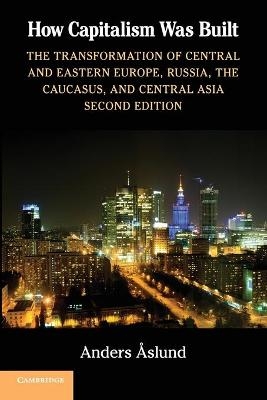
How Capitalism Was Built
Cambridge University Press (Verlag)
978-1-107-62818-2 (ISBN)
Anders Aslund is known to make bold predictions that initially arouse controversy but soon become common wisdom. In Gorbachev's Struggle for Economic Reform (1989), he foresaw the collapse of the Soviet political and economic system. After Russia's financial crisis of 1998, observers declared the market economic experiment a failure, Aslund foresaw market economic success (Building Capitalism, 2002). In How Capitalism Was Built, 2nd Edition, he asks - and answers for the twenty-one countries he investigates: • Why did communism collapse? • Why did Russia not choose gradual reforms like China did? • Wherein lies the relative success of postcommunist transformation? • How did the oligarchs arise and decline vis-à-vis authoritarian leaders? Anyone who wants to understand the often confusing postcommunist dramas and obtain an early insight into the future will find this intellectually stimulating book useful. This edition includes updates to each chapter and new chapters on the impact of the global financial crisis and the European Union.
Anders Aslund is a leading specialist on postcommunist economic transformation with more than 35 years of experience in the field. The author of eleven books, he has also worked as an economic advisor to the Russian, Ukrainian and Kyrgyz governments. Dr Aslund joined the Peterson Institute for International Economics in Washington DC as a senior fellow in 2006. Before that he was the Director of the Russian and Eurasian Program at the Carnegie Endowment for International Peace. He teaches at Georgetown University. He earned his PhD from Oxford University. He was born in Sweden and served as a Swedish diplomat.
Introduction: a world transformed; 1. Communism and its demise; 2. Radical reform versus gradualism; 3. Output: from slump to recovery and boom; 4. Liberalization: the creation of a market economy; 5. From hyperinflation to financial stability; 6. Privatization: the establishment of private property rights; 7. The social system; 8. The politics of transition; 9. From crime toward law; 10. The importance of the European Union; 11. The global financial crisis, 2007–12; Conclusions: a world transformed.
| Erscheint lt. Verlag | 12.11.2012 |
|---|---|
| Zusatzinfo | 7 Tables, unspecified; 45 Line drawings, unspecified |
| Verlagsort | Cambridge |
| Sprache | englisch |
| Maße | 152 x 229 mm |
| Gewicht | 570 g |
| Themenwelt | Geschichte ► Teilgebiete der Geschichte ► Wirtschaftsgeschichte |
| Wirtschaft ► Allgemeines / Lexika | |
| Wirtschaft ► Volkswirtschaftslehre ► Makroökonomie | |
| Wirtschaft ► Volkswirtschaftslehre ► Wirtschaftspolitik | |
| ISBN-10 | 1-107-62818-0 / 1107628180 |
| ISBN-13 | 978-1-107-62818-2 / 9781107628182 |
| Zustand | Neuware |
| Haben Sie eine Frage zum Produkt? |
aus dem Bereich


